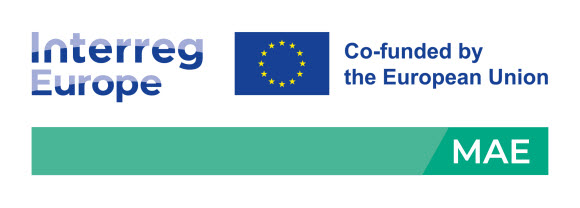Moving Towards Aerospace (MAE)
Clare County Council has secured funding under Interreg Europe to participate in a European project called Moving Towards Aerospace (MAE).
MAE helps policy makers and stakeholders to co-build ecosystems for the transition to the aerospace economy of SME's facing near-future obsolescence. The €1.9m project is run over four years (1st March 2023 to 28th February 2027) with partners from 7 regions across Europe, including Clare County Council, securing a total of €1.45m in European Regional Development Funding, through the Interreg Europe programme.
The Challenge – What does the project seek to address?
MAE addresses the need for sustainable and innovative transformation of industrial value chains, linked to future-oriented manufacturing potential. We consider how SMEs from industrial sector segments facing possible obsolescence can achieve a new role in the expanding aerospace sector. The challenge for public actors is to create an ecosystem to support this, ensuring stakeholder involvement, a responsible approach and supporting structures and skills needed by SME's.
Who and How?
Transnational co-operation:
MAE groups partners from 7 regions to work collaboratively and learn from each other in addressing the challenges each partner faces at a local level. Changes are expected to policy instruments*, notably in ecosystem support, financing for SMEs innovation and Public Authority capacity building. MAE achieves this through exchanging experiences in a context of interregional activities, communication and stakeholder engagement, all connected by a Responsible Innovation approach. *Policy Instruments such as ERDF Programmes, Local Strategies and Plans such as the County Development Plan, Local Area Plans, the Local Economic and Community Plan, Local Enterprise Development Plan.
Objective and Themes
MAE’s overall objective is to develop public policies that support a responsible transformation of relevant industrial sectors towards the future orientated, aerospace sector. MAE achieves this by using interregional learning and a responsible innovation approach that reflects on and anticipates potential transformation impact and considers the:
- Role of territorial stakeholders in value chains and innovation ecosystems and in multi-level governance for effective transformation
- Systemic elements that must be present or created, such as specialised curricula, research facilities, incubators and infrastructure
- Support measures for product and process innovation in SMEs, creating skills and opportunities to transform production and products
- Capacity needed in public authorities to ensure all of the above and attract investment, also by pooling regional, national and international resources
Steps and Activities – 4 Year Programme
- Step 1 - "Understanding aerospace – modelling the transformation". Activities: Master class on RI and aerospace; Modelling of the ecosystem and capacity building on mapping the existing and design of shared mapping tools.
- Step 2 - “Mapping the transformation”. Activities: Analysing and mapping the industrial sector segments selected for transformation; Mapping the existing ecosystem, systemic elements, support measures and public authority capacity; Identifying strengths and challenges in each territory and existing good practices.
- Step 3 - “Road mapping the transformation”. Activities: Road-mapping policy improvements at territorial level; Implementing change or action-planning.
- Step 4 - “Monitoring the transformation”. Activities: monitoring of policy improvements; Sharing results.
Stakeholder Engagement
Through open dialogue, operational cooperation and periodical events, MAE engages with:
- SMEs (beneficiaries of policy change)
- Intermediaries in territorial ecosystems (clusters, chambers of commerce, innovation agencies, large enterprises)
- Research / Education actors (as experts, technological enables and for the development of new specialised curricula)
- Public authorities (regional or sub-regional with potential to support transition to aerospace)
- Local communities (including youth to ensure engagement of the whole quadruple helix)
Partners
- LP01 CISE – Centre for Innovation and Economic Development
- PP02 Municipality of Forlì
- PP03 South-West Oltenia Regional Development Agency
- PP04 Nordland County Council
- PP05 Galicia Innovation Agency
- PP06 Delft University of Technology
- PP07 Prague Innovation Institute
- PP08 Clare County Council
- ASP City of Delft
Contact
For further information, please contact:
Marie Lynch
Email: mlynch@clarecoco.ie
Website: Interreg Europe Funding website

Page last reviewed: 15/05/23
Content managed by: Economic Development
Back to topThis is just for feedback on our web site, not comments or questions about our services.
To tell us about anything else, go to our contact us pages.
